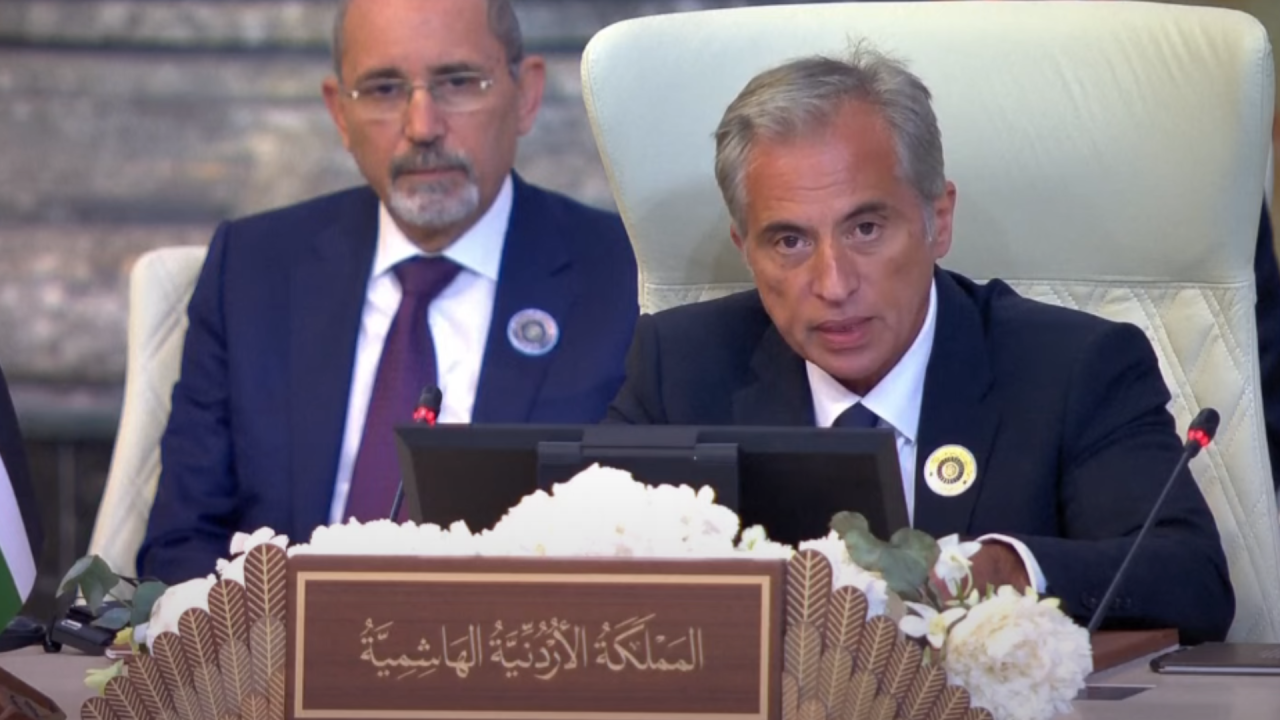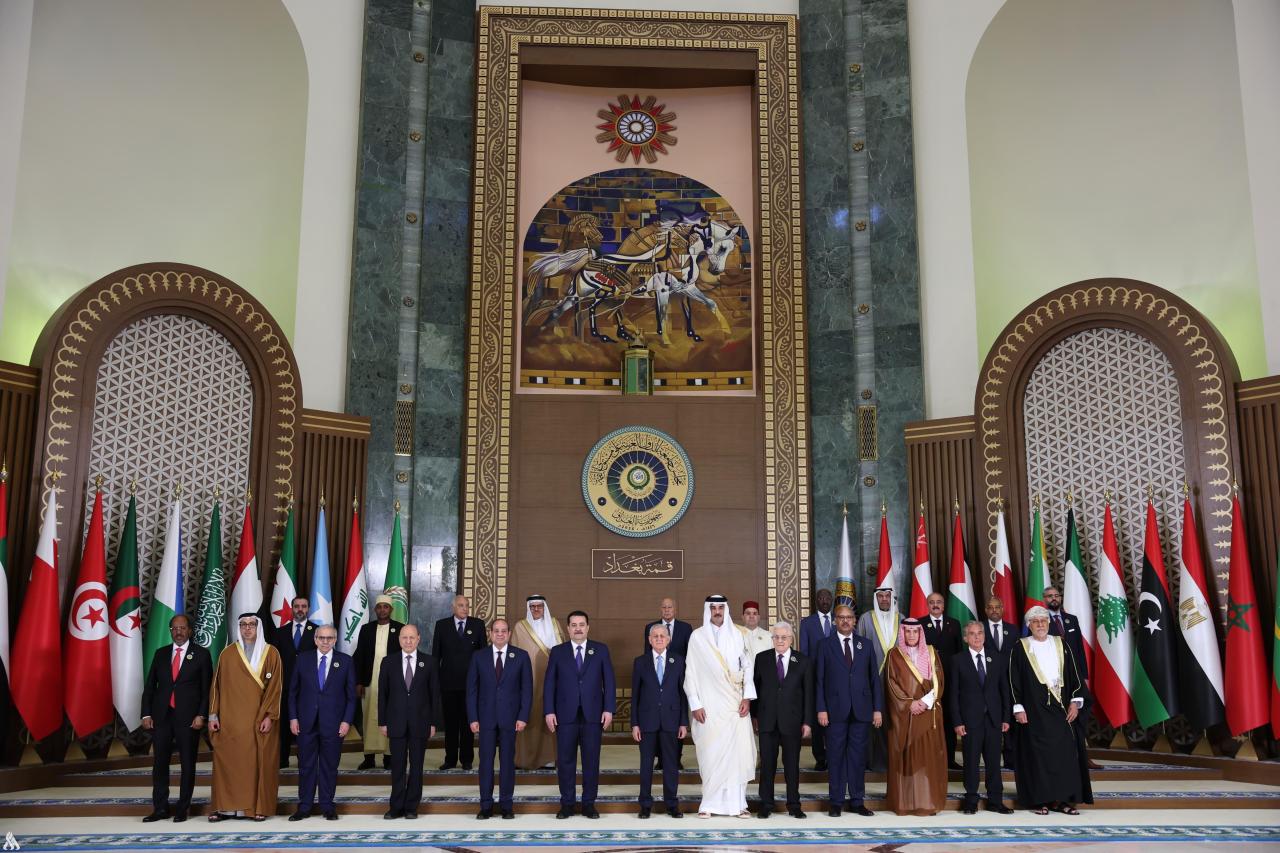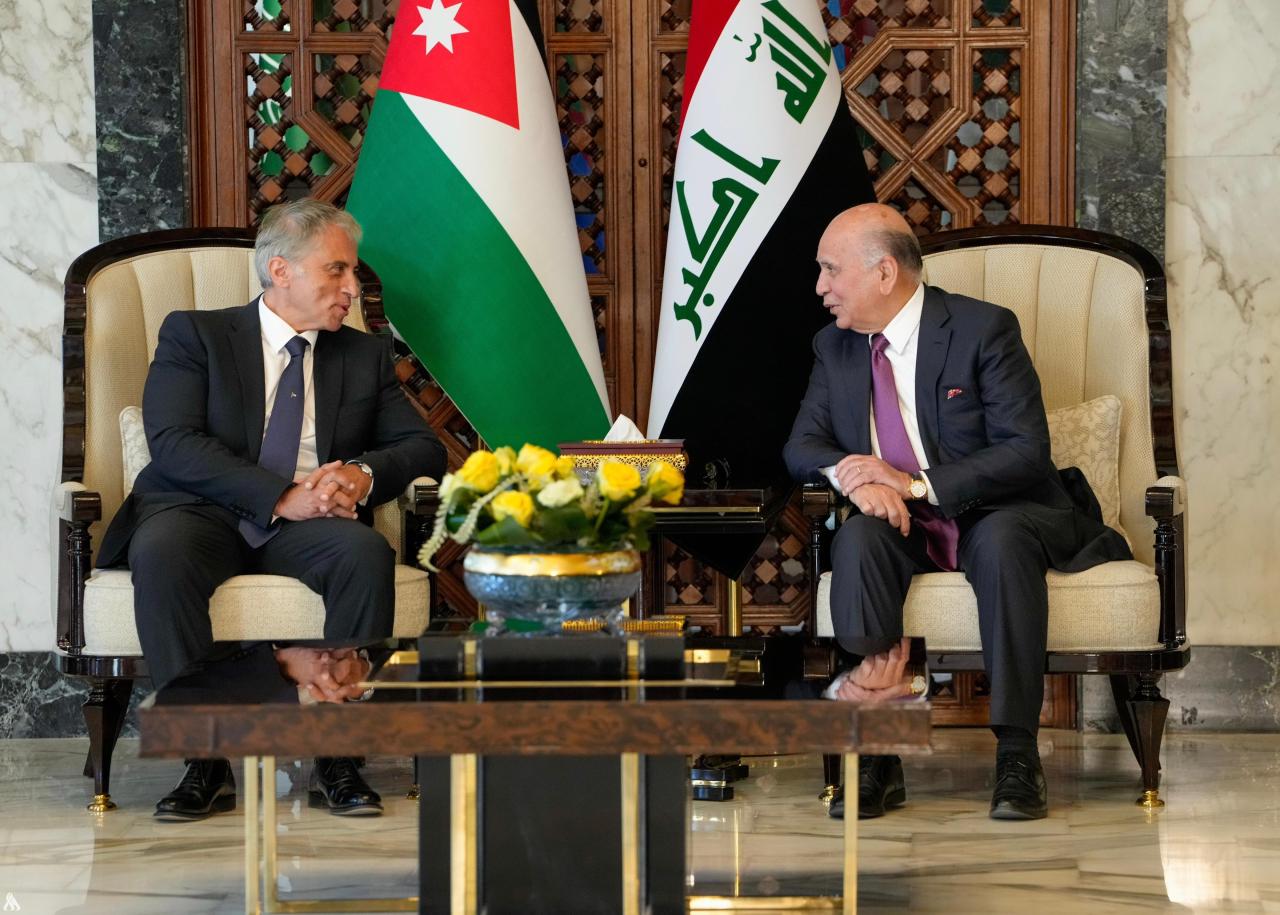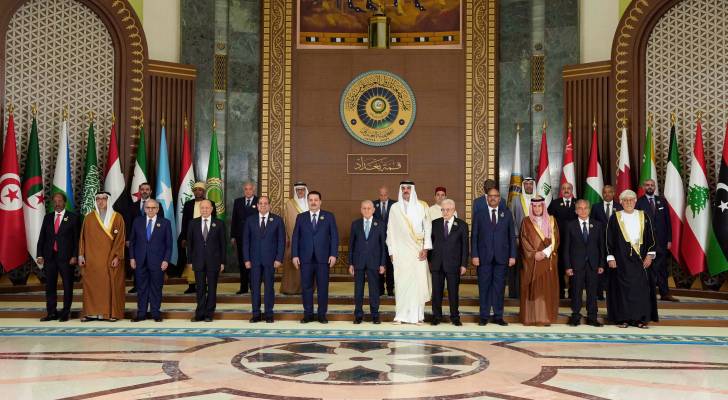Arab leaders pose for a group photo ahead of the opening session of the 34th Arab League summit in Baghdad.
Arab leaders meet in Baghdad summit; release joint statement on regional issues
Baghdad hosted the 34th Arab League Summit on Saturday, as “Israeli” airstrikes continued to pound Gaza, deepening the humanitarian crisis in the besieged Palestinian Strip.
The summit came in the wake of US President Donald Trump’s Gulf tour, during which he reaffirmed his controversial desire for the United States to “own” Gaza.
Flags of the 22 Arab League member states were draped across the streets of the Iraqi capital, which—like much of the country—is experiencing relative stability after decades of war and unrest.
The summit unfolded against a backdrop of sweeping regional shifts. Syria's transitional government, led by Ahmed al-Sharaa, is seeking to reset ties with Arab states and the West.
Meanwhile, the war in Gaza has weakened Iran and its allies, even as Tehran continues nuclear talks with Washington.
In addition to Arab leaders, the summit was attended by UN Secretary-General António Guterres and Spanish Prime Minister Pedro Sánchez—whose country recognized the State of Palestine last year and who remains one of Europe’s most vocal critics of “Israel”.
34th Arab League Baghdad Summit final statement
Arab leaders urged the international community Saturday to fund their plan to rebuild the Gaza Strip after US President Donald Trump reiterated a proposal to take over the Palestinian territory.
An Arab League summit in Baghdad said in its final statement that it urges "countries and international and regional financial institutions to provide prompt financial support" to back its Gaza reconstruction plan.
It also urged the international community to apply pressure for a Gaza ceasefire and humanitarian aid access to the besieged Palestinian territory.
"We call on the international community... to exert pressure to end the bloodshed and ensure that urgent humanitarian aid can enter without obstacles all areas in need in Gaza," the leaders said in a joint final statement at a summit in Baghdad.
On Syria, they welcomed a US decision to lift sanctions on war-ravaged Syria.
"The reconstruction of Syria is impacted by economic and financial sanctions," the statement from the Arab League summit said. "We welcome the US President Donald Trump's announcement to lift the sanctions imposed" on Syria.
Baghdad Declaration
The final communique, dubbed the “Baghdad Declaration,” reaffirmed the centrality of the Palestinian issue to the Arab world and called for an immediate ceasefire in Gaza.
It urged influential global powers to fulfill their moral and legal responsibilities by pushing for an end to the war and ensuring unimpeded humanitarian access to all areas in need within Gaza.
The declaration also called on nations to provide political, financial, and legal support to the joint Arab-Islamic plan for early recovery and reconstruction in Gaza, adopted at the March emergency summit in Cairo and the Organization of Islamic Cooperation meeting in Jeddah the same month.
It welcomed Arab proposals to establish a fund for Gaza’s reconstruction and emphasized the need for coordinated efforts to open all crossings to allow humanitarian aid into all Palestinian territories.
The declaration reiterated support for a just and comprehensive resolution to the Palestinian issue and backed Palestinian President Mahmoud Abbas’s call for an international peace conference and irreversible steps toward a two-state solution in line with the Arab Peace Initiative and international resolutions.
It called for deploying a United Nations peacekeeping force in the occupied Palestinian territories until the two-state solution is achieved, and urged the UN Security Council to take the necessary steps to implement it.
Arab leaders also encouraged all Palestinian factions to agree on a unified national vision and political project.
The declaration praised European nations including Spain, Norway, and Ireland for their recognition of the State of Palestine, and expressed support for South Africa’s case against Israel at the International Court of Justice.
Jerusalem, Syria, Lebanon, and Regional Stability
The final communique reaffirmed the sanctity of Jerusalem and its significance to the three Abrahamic religions. It condemned “Israeli” efforts to “Judaize” the city, alter its Arab-Islamic-Christian identity, and undermine its legal and historical status.
It stressed the need to protect Christian and Islamic holy sites in Bethlehem and throughout Jerusalem, reaffirming support for the Hashemite custodianship over the holy places, under the care of Jordan’s King Abdullah II.
The declaration stated that Al-Aqsa Mosque, encompassing its entire 144-dunum compound, is a sacred Muslim-only site.
It also voiced support for the role of Morocco’s King Mohammed VI as head of the Jerusalem Committee and the work of Bayt Mal Al-Quds Agency.
On Syria, the declaration affirmed respect for the will of the Syrian people and supported the country’s unity, stability, and sovereignty.
It condemned ongoing “Israeli” strikes on Syrian territory and emphasized the need for an inclusive political transition that preserves societal peace and diversity.
The declaration welcomed President Donald Trump’s decision to lift US sanctions on Syria and called for a comprehensive national dialogue, offering Iraq’s readiness to host the talks in coordination with the Arab League.
Regarding Lebanon, the summit voiced full support for preserving the country’s unity and sovereignty, encouraged political consensus, welcomed recent municipal elections, and called for the implementation of urgent economic reforms.
Yemen, Sudan, Libya, and Water Security
The declaration expressed solidarity with Yemen and its efforts to maintain sovereignty and unity, urging internal dialogue to resolve its conflict.
It also stressed the importance of reaching a political solution in Sudan to halt the conflict, ensure territorial integrity, and facilitate humanitarian access.
The declaration welcomed the IGAD statement promoting unified mediation tracks and acknowledged the Jeddah Declaration initiative.
On Libya, Arab leaders called for a Libyan-led political process that preserves the country’s unity and sovereignty, rejected all foreign interference, and called for the withdrawal of all foreign fighters and mercenaries within a defined timeframe.
The declaration emphasized the importance of nuclear disarmament in the Middle East and the establishment of a region free from weapons of mass destruction. It also identified water security as a cornerstone of Arab national security, expressing support for Egypt, Sudan, Iraq, and Syria in securing their legitimate water rights.
Condemnation of Terrorism and Support for US-Iran Talks
The summit reaffirmed a unified Arab stance against terrorism in all forms, organized crime, drug trafficking, and human smuggling. It welcomed Iraq’s efforts in combating terrorism and urged stronger measures against hate speech, extremism, and incitement.
The Baghdad Declaration also expressed support for ongoing talks between the US and Iran aimed at achieving peaceful use of nuclear energy. It commended Oman’s mediation role and reiterated Arab commitment to working closely with the United Nations and its agencies.
Syria to enter new phase after US sanctions lifted: foreign minister
Syrian Foreign Minister Asaad al-Shibani said Syria is entering a new chapter following US President Donald Trump's announcement to lift sanctions on the country—calling the move a key signal of recovery and the beginning of reconstruction.
In his remarks during the Arab League Summit in Baghdad, al-Shibani expressed Syria’s deep gratitude to Saudi Arabia, Turkey, Qatar, the UAE, and other Arab states for their supportive stances and diplomatic efforts that helped pave the way for the shift.
He described their support as a reflection of “historic Arab awareness and genuine solidarity with the Syrian people.”
Al-Shibani stated that Syria, having paid a heavy price for past policies, is now returning to the Arab fold.
He emphasized that “the new Syria is not hostile to anyone,” extending a message of openness and inclusion, and rejecting isolation or discrimination. “Syria is a homeland for all its people,” he said.
He stressed that the Syrian people have remained committed to their Arab identity, believing the Arab world to be their true refuge, and praised all sincere Arab initiatives that contributed to lifting the blockade on his country.
“Even after Syria’s liberation, we continue to pay the price of foreign interventions and internal conflicts,” al-Shibani added, warning of ongoing support for separatist factions and sectarian agendas aimed at undermining state institutions.
Abbas calls on Hamas to relinquish Gaza control
Palestinian President Mahmoud Abbas said the Palestinian people are facing a campaign of genocide, stressing that the current critical phase requires greater Arab and international support.
Speaking at the Arab Summit in Baghdad, Abbas called for a comprehensive Arab plan to end the aggression, urging the establishment of a permanent and inclusive ceasefire as a step toward implementing the two-state solution and establishing an independent Palestinian state.
He outlined his political vision, which includes halting unilateral actions such as settlement expansion and forced displacement.
He reaffirmed that the Palestine Liberation Organization (PLO) remains the sole legitimate representative of the Palestinian people, adding that any group seeking to join must recognize this legitimacy.
Abbas urged Hamas to relinquish its control of the Gaza Strip and hand over its weapons to the Palestinian Authority. He also called on all Palestinian factions to surrender their arms in support of unified Palestinian decision-making.
He expressed appreciation to US President Donald Trump for efforts made to end the war in Gaza.
Egypt's Sisi urges Trump to apply pressure for Gaza ceasefire
Egyptian President Abdel Fattah al-Sisi urged his US counterpart Donald Trump on Saturday to apply pressure for a Gaza ceasefire.
"I call on President Trump, as a leader who wants to consolidate peace, to apply all necessary efforts and pressure for a ceasefire in the Gaza Strip," which would pave the way "for a serious political process in which he would be a mediator and a sponsor," Sisi said in an address to an Arab League summit in Baghdad.
Jordan’s PM Hassan reaffirms support for Gaza during Baghdad summit
Jordanian Prime Minister Jafar Hassan affirmed on Saturday at the Arab League Summit in Baghdad Jordan’s commitment to supporting Gaza through the ongoing dire humanitarian conditions.
Hassan said more than a year and a half has passed since the start of what he called the "brutal war" on Gaza, yet the humanitarian catastrophe continues, claiming tens of thousands of innocent civilian lives.
He warned that the consequences of the war would persist for years, with the international community failing to halt what he described as blatant violations of international laws and norms and a direct affront to humanity.
“The first and foremost priority today is to end the war and stop the humanitarian catastrophe,” Hassan stressed, calling for unified Arab and international efforts to support the Palestinian people, end violations against them, and cooperate with international partners to rebuild Gaza.
He commended Egypt, Qatar, and the United States for their efforts toward a ceasefire, underlining the need for a lasting truce and the urgent, sufficient entry of humanitarian aid into the enclave.
Hassan also asserted that there can be no peace or security without an end to “Israeli” violations in Jerusalem and the West Bank, noting that such actions and continued settlement expansion keep the region trapped in conflict.
He reaffirmed Jordan’s unwavering commitment to its historic role in safeguarding Islamic and Christian holy sites in Jerusalem under the Hashemite Custodianship, and expressed Jordan’s full support for Syria’s unity, sovereignty, and the return of refugees.

Spain PM calls for “pressure on Israel” to halt the massacre in Gaza
Spanish Prime Minister Pedro Sanchez called on Saturday for pressure to stop “Israel's” "massacre in Gaza" and said Madrid plans a UN resolution requesting a world court ruling on aid access to the Palestinian territory.
Sanchez told an Arab League summit in Baghdad that the Gaza war has led to "unacceptable numbers" of victims in Gaza, violating the "principle of humanity".
"The extremely grave humanitarian crisis Gaza has endured since October 2023 has caused more than 50,000 dead, 100,000 wounded and two million displaced," said Sanchez, who has sharply criticised the “Israeli” aggression.
World leaders should "intensify our pressure on Israel to halt the massacre in Gaza, particularly through the channels afforded to us by international law", he said.
The Socialist prime minister said Spain will "submit to the United Nations General Assembly a proposal to ask the International Court of Justice to rule on Israel's compliance with its international obligations on humanitarian aid access to Gaza", under a complete aid blockade since March 2.
Sanchez said Spain would also back another draft UN resolution calling on “Israel” to "end the humanitarian blockade" and guarantee "full and unrestricted access for humanitarian aid" to enter Gaza.
On May 7, Sanchez told the Spanish parliament that Madrid would present a draft resolution at the UN General Assembly aimed at "proposing urgent measures to stop the killing of innocent civilians and ensure humanitarian aid" in Gaza.
Speaking in Baghdad on Saturday, he said that promoting "a political solution" to the conflict was a priority.
"The only path towards peace in the region" is "the implementation of the two-state solution" to the Israeli-Palestinian conflict, he said.
"I wish once again to urge other countries to recognise the State of Palestine."
He expressed hope for progress in an international conference on the two-state solution planned for June in Saudi Arabia, which represents "a historic opportunity".
But Sanchez said that "it will only succeed if there is broad Arab and European consensus that leads to firm action by the entire international community".
“No just peace without a Palestinian State,” says Egypt’s Sisi
Egyptian President Abdel Fattah el-Sisi on Saturday warned that the Palestinian cause is facing “its most dangerous and sensitive moment in history,” saying “Israeli” forces are carrying out systematic killings and destruction across Gaza and the West Bank.
In his address at the 34th Arab League Summit in Baghdad, Sisi emphasized Egypt’s ongoing efforts—alongside Qatar and the United States—to halt the bloodshed in Gaza and push for an immediate ceasefire.
He firmly rejected any attempts to forcibly displace Palestinians from their land, reiterating that a just and comprehensive peace in the Middle East will remain out of reach without the establishment of an independent Palestinian state along the 1967 borders, with East Jerusalem as its capital.
He added that even if “Israel” succeeds in normalizing relations with Arab states, a just and lasting peace will remain unattainable without the establishment of an independent Palestinian state.
Sisi also announced Egypt’s intention to host an international conference to support the reconstruction of Gaza once hostilities end, in a bid to ease the suffering of the Palestinian people and bolster their resilience.
UN chief calls for permanent and immediate Gaza ceasefire
United Nations chief Antonio Guterres called Saturday for a permanent and immediate ceasefire in Gaza after “Israel” announced early stages of an intensified operation on the besieged Palestinian strip.
"We need a permanent ceasefire, now," Guterres told leaders gathered in Baghdad for an Arab League summit.
"I am alarmed by reported plans by Israel to expand ground operations and more."
Some Arab states under “existential threat,” says Arab League Secretary-General
Arab League Secretary-General Ahmed Aboul Gheit warned Saturday that Arab national security remains elusive, cautioning that the very existence of some Arab states is under threat due to escalating crises and internal divisions.
Aboul Gheit highlighted the dire humanitarian crisis in Sudan, the internal rift threatening Libya’s unity, and the deep-rooted challenges Lebanon faces on its path to recovery.
He also condemned continued “Israeli” violations of Lebanese sovereignty, reiterating the Arab League’s firm rejection of what he called Zionist expansionist ambitions.
Aboul Gheit reaffirmed that the Palestinian cause remains “a bleeding wound at the heart of the Arab nation,” emphasizing its centrality to regional peace and unity.
Iraq pledges $40 million for Gaza, Lebanon reconstruction
Iraq Prime Minister Mohammed Shia al-Sudani, whose country is hosting an Arab League summit, said Saturday it would provide USD 40 million for the reconstruction of Lebanon and Gaza after aggressions waged by “Israel”.
Iraq backs the creation of an "Arab fund to support reconstruction efforts" after crises in the region, Sudani told Arab leaders in Baghdad.
Iraq will contribute "$20 million to the reconstruction of Gaza and $20 million for the reconstruction of Lebanon," he added.
Al-Sudani welcomed the United States’ recent decision to lift sanctions on Syria, calling it a positive step toward restoring stability in the war-torn country.
On nuclear negotiations, the Iraqi premier voiced his country’s support for the ongoing U.S.-Iran negotiations, stressing Iraq’s belief in peace and coexistence as the foundation for resolving disputes.
Al-Sudani concluded by announcing the launch of 18 ambitious initiatives aimed at reinvigorating joint Arab action, affirming Iraq’s commitment to playing an active role in promoting cooperation and integration among Arab nations.
34th Arab League Summit kicks off in Baghdad
The 34th Arab League Summit has kicked off in the Iraqi capital Baghdad.
Gaza is at the top of the agenda, as Arab leaders will re-endorse the Gaza Arab-Islamic reconstruction plan put forward at the emergency summit in Cairo last March.
The summit will also address the situation in Syria, Lebanon, Libya, Somalia, and the US-Iran nuclear negotiations.

Jordan PM Hassan arrives in Baghdad for Arab League summit
Deputizing for His Majesty King Abdullah II, Jordan’s Prime Minister Jaafar Hassan arrived Saturday at the Presidential Palace in Baghdad to take part in the 34th Arab League Summit, joining fellow Arab leaders and representatives for high-level discussions on key regional issues.

Delegations begin arriving at Arab League Summit venue in Baghdad
Delegations from across Arab states began arriving in Baghdad to attend the 34th Arab League Summit, hosted by Iraq.
Iraqi President Abdul Latif Jamal Rashid arrived at the summit venue, where he is set to take part in the official sessions alongside his Arab counterparts.
Egyptian President Abdel Fattah el-Sisi also landed in the Iraqi capital to join the summit, accompanied by Kuwaiti Foreign Minister Abdullah Ali Abdullah and Bahrain’s Foreign Minister.
Iraqi Prime Minister Mohammed Shia’ al-Sudani welcomed Arab League Secretary-General Ahmed Aboul Gheit at the summit venue, where the two discussed the summit’s agenda and its key priorities. Al-Sudani also received the head of Yemen’s delegation.
In addition to Arab leaders, the summit will be attended by UN Secretary-General António Guterres and Spanish Prime Minister Pedro Sánchez—whose country recognized the State of Palestine last year and who remains one of Europe’s most vocal critics of “Israel”.
Palestinian President Mahmoud Abbas was among the first leaders to arrive in Baghdad on Friday afternoon. Diplomatic sources said that most Gulf countries will be represented at the ministerial level.
The summit convenes amid pressing regional challenges, with the Palestinian cause and the ongoing war in Gaza topping the agenda.
Discussions will also focus on regional security and efforts to boost Arab economic integration, with hopes for stronger collective action across the Arab world.




